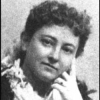Olive Schreiner

Olive Schreiner
Olive Schreinerwas a South African author, anti-war campaigner and intellectual. She is best remembered today for her novel The Story of an African Farm which has been highly acclaimed since its first publication in 1883 for the bold manner in which it deals with some of the burning issues of the day, including agnosticism, existential independence, individualism, the professional aspirations of women, and the elemental nature of life on the colonial frontier. In more recent studies she has also been...
NationalitySouth African
ProfessionWriter
Date of Birth24 March 1855
How hard it is to make your thoughts look anything but imbecile fools when you paint them with ink on paper.
Soul, what have I to do with you?
It is finer to bring one noble human being into the world and rear it well... than to kill ten thousand.
We were equals once when we lay new-born babes on our nurse's knees. We will be equal again when they tie up our jaws for the last sleep.
Power! Did you ever hear of men being asked whether other souls should have power or not? It is born in them. You may dam up the fountain of water, and make it a stagnant marsh, or you may let it run free and do its work; but you cannot say whether it shall be there; it is there. And it will act, if not openly for good, then covertly for evil; but it will act.
No good work is ever done while the heart is hot and anxious and fretted.
Marriage for love is the most beautiful external symbol of the union of souls; marriage without it is the least clean traffic that defiles the world.
The surest sign of fitness is success.
Now we have no God. We have had two: the old God that our fathers handed down to us, that we hated, and never liked; the new one that we made for ourselves, that we loved; but now he has flitted away from us, and we see what he was made of - the shadow of our highest ideal, crowned and throned. Now we have no God.
Slavery may, perhaps, be best compared to the infantile disease of measles; a complaint which so commonly attacks the young of humanity in their infancy, and when gone through at that period leaves behind it so few fatal marks; but which when it normally attacks the fully developed adult becomes one of the most virulent and toxic of diseases, often permanently poisoning the constitution where it does not end in death.
No woman has the right to marry a man if she has to bend herself out of shape for him. She might wish to, but she could never be to him with all her passionate endeavor what the other woman could be to him without trying. Character will dominate over all and will come out at last.
We have been so blinded by thinking and feeling that we have never seen the World.
There are some of us who in after years say to Fate, 'Now deal us your hardest blow, give us what you will; but let us never again suffer as we suffered when we were children.' The barb in the arrow of childhood's suffering is this: its intense loneliness, its intense ignorance.
A child sees everything, looks straight at it, examines it, without any preconceived idea; most people, after they are about eleven or twelve, quite lose this power, they see everything through a few preconceived ideas which hang like a veil between them and the outer world.